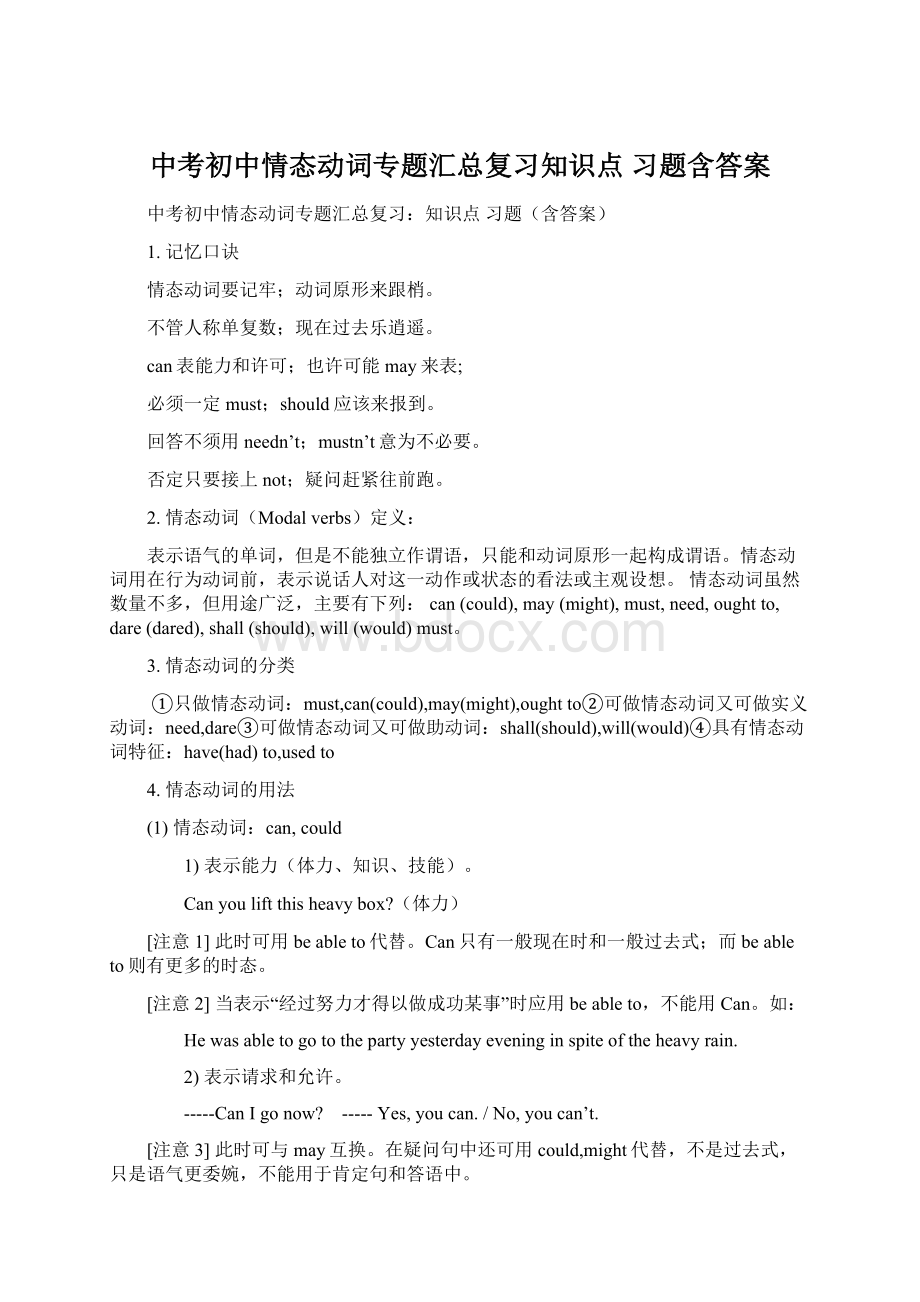中考初中情态动词专题汇总复习知识点 习题含答案.docx
《中考初中情态动词专题汇总复习知识点 习题含答案.docx》由会员分享,可在线阅读,更多相关《中考初中情态动词专题汇总复习知识点 习题含答案.docx(14页珍藏版)》请在冰豆网上搜索。

中考初中情态动词专题汇总复习知识点习题含答案
中考初中情态动词专题汇总复习:
知识点习题(含答案)
1.记忆口诀
情态动词要记牢;动词原形来跟梢。
不管人称单复数;现在过去乐逍遥。
can表能力和许可;也许可能may来表;
必须一定must;should应该来报到。
回答不须用needn’t;mustn’t意为不必要。
否定只要接上not;疑问赶紧往前跑。
2.情态动词(Modalverbs)定义:
表示语气的单词,但是不能独立作谓语,只能和动词原形一起构成谓语。
情态动词用在行为动词前,表示说话人对这一动作或状态的看法或主观设想。
情态动词虽然数量不多,但用途广泛,主要有下列:
can(could),may(might),must,need,oughtto,dare(dared),shall(should),will(would)must。
3.情态动词的分类
①只做情态动词:
must,can(could),may(might),oughtto②可做情态动词又可做实义动词:
need,dare③可做情态动词又可做助动词:
shall(should),will(would)④具有情态动词特征:
have(had)to,usedto
4.情态动词的用法
(1)情态动词:
can,could
1)表示能力(体力、知识、技能)。
Canyouliftthisheavybox?
(体力)
[注意1]此时可用beableto代替。
Can只有一般现在时和一般过去式;而beableto则有更多的时态。
[注意2]当表示“经过努力才得以做成功某事”时应用beableto,不能用Can。
如:
Hewasabletogotothepartyyesterdayeveninginspiteoftheheavyrain.
2)表示请求和允许。
-----CanIgonow?
-----Yes,youcan./No,youcan’t.
[注意3]此时可与may互换。
在疑问句中还可用could,might代替,不是过去式,只是语气更委婉,不能用于肯定句和答语中。
----CouldIcometoseeyoutomorrow?
----Yes,youcan.(No,I’mafraidnot.)
3)表示客观可能性(客观原因形成的能力)。
They’vechangedthetimetable,sowecangobybusinstead.
4)表示推测(惊讶、怀疑、不相信的态度),用于疑问句、否定句和感叹句中。
Canthisbetrue?
Thiscan’tbedonebyhim.
(2)情态动词:
may,might
1)表示请求和允许。
might比may语气更委婉,而不是过去式。
否定回答时可用can’t或mustn’t,表示“不可以,禁止”。
----May/MightItakethisbookoutoftheroom?
----Yes,youcan.(No,youcan’t/mustn’t.)
[注意4]用MayI...?
征徇对方许可时比较正式和客气,而用CanI...?
在口语中更常见。
[注意5]表示请求允许(即请求别人允许自己做某事),两者都可用,只是might表示的语气较委婉(但并不表示过去)。
如:
IwonderifImightuseyourphone.不知可否用一下你的电话。
2)用于祈使句,表示祝愿。
Mayyousucceed!
3)表示推测、可能性(不用于疑问句)。
might不是过去式,它所表示的可能性比may小。
Yourmothermay/mightnotknowthetruth.
(3)情态动词:
must,haveto
1)表示必须、必要。
Youmustcomeintime.
[注意6]在回答引出的问句时,如果是否定的,不能用mustn’t(禁止,不准),而用needn’t,don’thaveto(不必).
----Mustwehandinourexercisebookstoday?
----Yes,youmust.or ----No,youdon’thaveto/youneedn’t.
2)must是说话人的主观看法,而haveto则强调客观需要。
Must只有一般现在时,haveto有更多的时态形式。
IhadtoworkwhenIwasyourage.
3)表示推测、可能性(只用于肯定的陈述句)
You’reTom’sgoodfriend,soyoumustknowwhathelikesbest.
(4)情态动词:
dare,need
这两词既可做实义动词用,又可做情态动词用。
作为情态动词,两者都只能用于疑问句,否定句和条件句。
need作实义动词时后面的不定式必须带to,而dare作实义动词用时,后面的to时常可以被省略。
1)dare作情态动词用时,常用于疑问句、否定句和条件从句中,过去式形式为dared。
1.HowdareyousayI’munfair?
2.HedarenotspeakEnglishbeforesuchacrowd,darehe?
3.Ifwedarednotgotherethatday,wecouldn’tgetthebeautifulflowers.
2)need作情态动词用时,常用于疑问句、否定句。
在肯定句中一般用must,haveto,oughtto,should代替。
1.Youneedn’tcomesoearly.
2.----NeedIfinishtheworktoday?
----Yes,youmust./No,youneedn’t.
3)dare和need作实义动词用时,有人称、时态和数的变化。
在肯定句中,dare后面常接带to的不定式。
在疑问句和否定句中,dare后面可接带to或不带to的不定式。
而need后面只能接带to的不定式。
1.Idaretoswimacrossthisriver.
2.Hedoesn’tdare(to)answer.
3.Heneedstofinishhishomeworktoday.
(5)情态动词:
shall,should
基本上shall和will都可以用在将来时,而should是一个情态动词,表示“应该怎样”
1)shall用于第一人称,征求对方的意见。
Whatshallwedothisevening?
2)shall用于第二、三人称,表示说话人给对方的命令、警告、允诺或威胁。
1.Youshallfailifyoudon’tworkhard.(警告)
2.HeshallhavethebookwhenIfinishit.(允诺)
3.Heshallbepunished.(威胁)
(6)情态动词:
will,would
1)表示请求、建议等,would更委婉。
Will/Wouldyoupassmetheball,please?
2)表示意志、愿望和决心。
1.Iwillneverdothatagain.
2.Theyaskedhimifhewouldgoabroad.
3)would表示过去反复发生的动作或某种倾向。
would表示过去习惯时比usedto正式,且没有“现已无此习惯”的含义。
1.Duringthevacation,hewouldvisitmeeveryotherday.
2.Thewoundwouldnotheal.
4)表示估计和猜想。
Itwouldbeaboutteno’clockwhenshelefthome.
(7)情态动词:
should,oughtto
1)should,oughtto表示“应该”,oughtto表示义务或责任,比should语气重。
1.Ishouldhelpherbecausesheisintrouble.
2.Yououghttotakecareofthebaby.
2)表示劝告、建议和命令。
should,oughtto可通用,但在疑问句中常用should。
1.Youshould/oughttogotoclassrightaway.
2.ShouldIopenthewindow?
3)表示推测
should,oughtto(客观推测),must(主观推测)。
1.Hemustbehomebynow.(断定他已到家)
2.Heoughtto/shouldbehomebynow.(不太肯定)
3.Thisiswheretheoilmustbe.(直爽)
4.Thisiswheretheoiloughtto/shouldbe.(含蓄)
情态动词练习题
()1.John___cometoseeustonight,butheisn'tverysureyet.
A.mayB.canC.hastoD.must
()2.They___dowellintheexam.
A.canbeabletoB.beableto C.canabletoD.areableto
()3.--MayItakethisbookout?
-No,you___.
A.can'tB.maynotC.needn'tD.aren't
()4.You___goandseeadoctoratoncebecauseyou'regotafever.
A.canB.mustC.dareD.would
()5.-CanyouspeakJapanese?
-No,I____.
A.mustn'tB.can'tC.needn'tD.maynot
()6.-He___beintheclassroom,Ithink.
-No,he___beintheclassroom.Isawhimgohomeaminuteago.
A.can;maynotB.must;maynotC.may;can'tD.may;mustn't
()7.-ShallIgetonemorecakeforyou,Dad?
-Thanks,butyou___,I'vehadenough.
A.maynotB.mustnotC.can'tD.needn't
()8.Eventhetopstudentsinourclasscan'tworkoutthisproblem,soitbeverydifficult.
A.mayB.mustC.canD.need
()9.Heisn'tatschool.Ithinkhe___beill.
A.canB.shallC.mustD.hasto
()10.___Itakethisone?
A.MayB.WillC.AreD.Do
()11.Thechildren___playfootballontheroad.
A.can'tB.canC.mustn'tD.must
()12.You___belateforschoolagainnexttime.
A.mustn'tB.needn't C.don'thavetoD.don'tneedto
()13.-MustIdomyhomeworkatonce?
-No,you___.
A.needn'tB.mustn'tC.can'tD.maynot
()14.Hisarmisallright.He___goandseethedoctor.
A.hasnottoB.don'thaveto C.haven'ttoD.doesn'thaveto
()15.Hehadtogiveuptheplan,___he?
A.didB.didn'tC.doesD.doesn't
()16.Theyhadtowalkhere,___they?
A.mustn'tB.didC.didn'tD.hadn't
()17.Hehadbetterstayhere,___he?
A.didn'tB.don'tC.hadn'tD.isn't
()18.You'dbetter___latenexttime.
A.nottobeB.notbeC.won'tbeD.don'tbe
()19.You'dbetter___yourhair___onceamonth.
A.had;cutB.had;cutted C.have;cutD.have;cutted
()20.You___askthatmanoverthere.Maybeheknowstheway.
A.hadbetternottoB.hadnotbetterC.hadbetterD.hadbetternot
()21.-ShallwegoandvisittheHistoryMuseumnextSunday?
A.HereyouareB.Sorry,Ican'tC.Yes,pleaseD.Letmetry
()22.-Whydon'tyouaskMiketogowithus?
-Thanks,___.
A.IwillB.Iwon'tC.leanD.Imay
()23.-___Itakethenewspaperaway?
-No,youmustn't.You____readitonlyhere.
A.Must;canB.May;canC.Need;mustD.Must;must
()24.Excuseme.___youpleasepassmethatcup?
A.DoB.ShouldC.WouldD.Must
()25.___youliketohaveanothertry?
-Yes,___.
A.Could;I'dlikeB.Will;IwillC.Would;I'dliketoD.Do;Ido
()26.You___worryaboutyourson.Hewillgetwellsoon.
A.needn'tB.can'tC.mustn'tD.haveto
()27.Thepoormanneedsourhelp,___he?
A.needB.needn'tC.doesD.doesn't
()28.-Mustwedoourhomeworkfirst?
-No,you___.Youmayhavearestfirst.
A.mustn'tB.needn'tC.maynotD.can't
情态动词习题答案:
1-5ADABB6-10CDBCA11-15AAADD16-20CCBCC 21-25CABCC26-28ADB
一、英语阅读理解专项练习试卷
1.阅读理解
Oldagemaynotsoundexciting.Butrecentfindingsoffergoodnewsforolderpeopleandforpeopleworriedaboutgettingolder.Researchersfoundthatpeoplebecomehappierandexperiencelessworryaftertheyreachtheageof50.Infact,theysaybytheageof85,peoplearehappierwiththeirlifethantheywerewhentheywere18yearsold.
Thefindingscamefromasurveyofmorethan340,000adultsintheUnitedStates.TheGallupOrganizationquestionedthembytelephone.Atthattime,thepeoplewerebetweentheagesof18and85.Theresearchersaskedquestionsaboutemotions,likehappiness,sadnessandworry.Theyalsoaskedaboutmental(气质)oremotionalstress.
ArthurStoneintheDepartmentofPsychiatryandBehavioralScienceatStonyBrookUniversityinNewYorkledthestudy.Histeamfoundthatlevelsofstresswerehighestamongadultsbetweentheagesof24and25.Thefindingsshowedthatstresslevelsdroppedsharplyafterpeoplereachedtheirfifties.
Thestudyalsoshowedthatmenandwomenhavesimilarfeelingpatternsastheygrowolder.However,womenatallagesreportedmoresadness,stressandworrythanmen.
Researcherssaytheydonotknowwhyhappinessincreasesaspeoplegetolder.Onetheoryisthat,aspeoplegrowolder,theygrowmorethankfulforwhattheyhaveandhavebettercontroloftheirfeelings.Sotheyspendlesstimethinkingaboutbadexperiences.
ProfessorStonesaystheemotionalpatternscouldbeconnectedwithchangesinhowpeopleseetheworld,ormaybeevenchangesinbrainchemistry.
Theresearchersalsoconsideredpossibleinfluenceslikehavingyoungchildren,beingunemployed(被解雇)orbeingsingle.Buttheyfoundthatinfluenceslikethesedidnotaffect(影响)thelevelsofhappiness.
(1)Whowouldprobablyshowthegreatestinterestinthepassage?
A. Thosewhoareworriedaboutgettingold.
B. Thosewhoaresingleandunemployed.
C. Thosewhofeelunhappyallthetime.
D. Thosewhosufferfrommentalstress.
(2)Whenmaypeoplehavethehighestlevelofstress?
A. Attheageof20.
B. Attheageof25.
C. Attheageof35.
D. Attheageof40.
(3)AccordingtoArthurStone'sidea,oldpeoplemay .
A. controltheirbehaviorsbetter
B. knowhowtospendmoneywisely
C. dreamaboutgoodthingseveryday
D. haveapositiveattitudetowardstheirlife
(4)Whatwouldbethebesttitleforthispassage?
A. TheYounger,theHappier
B. The